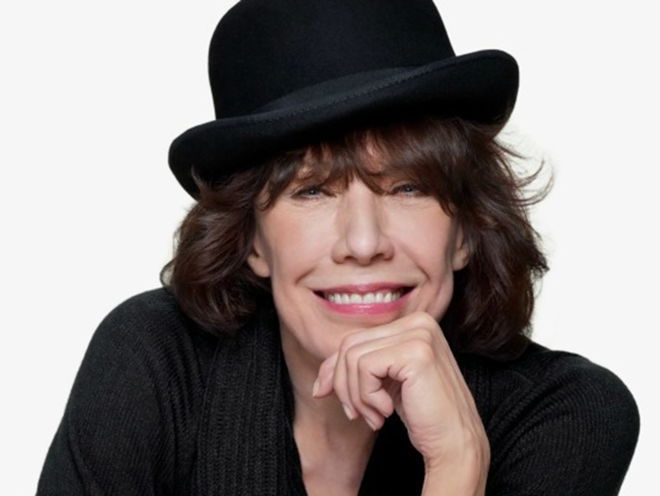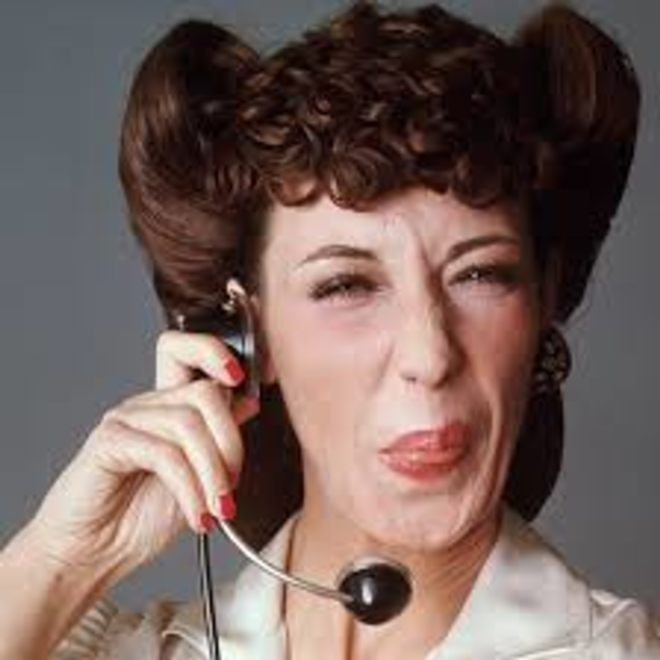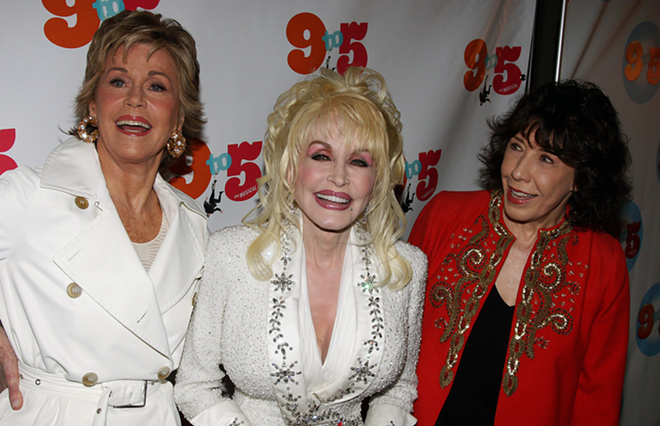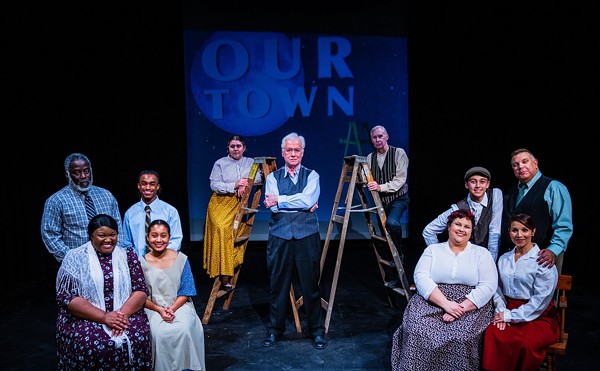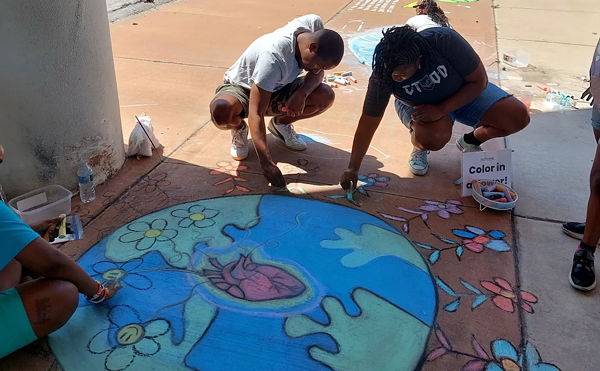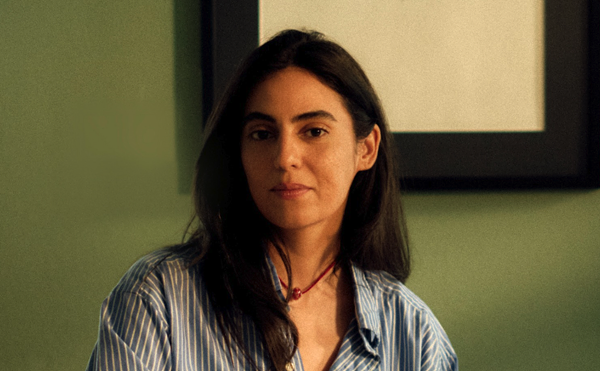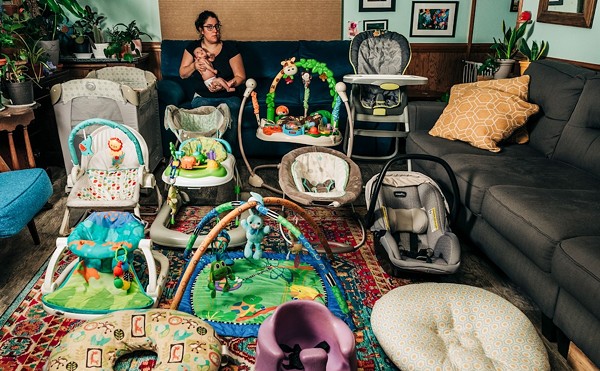I’ve grown up admiring Lily Tomlin. When we were kids, my friend Kelly and I used to pinch our noses and mimic Ernestine, Tomlin’s snooty operator on Laugh-In, and we watched The Incredible Shrinking Woman over and over. The comedy icon and character actor born Mary Jean Tomlin brings a kaleidoscope of idiosyncrasies and emotional depth to her roles. She popularized the one-woman show genre with The Search for Signs of Intelligent Life in the Universe, co-written by her and her longtime partner Jane Wagner, and worked with the late Robert Altman in Nashville, Short Cuts and Prairie Home Companion.
In the past few years Tomlin has turned in a memorable performance as Kenny Powers’ feisty mom in Eastbound and Down, she married Wagner, her partner of 42 years, and has signed on for a new Netflix sitcom with Jane Fonda, premiering next year.
The consummate character actor and "exponential threat" will be at Tampa Theatre next Thursday night to tell stories, do some stand-up and interact with her menagerie of characters via video screen.
While on tour in Tucson, she took time to have a phone conversation with CL, sharing tales about her childhood in inner-city Detroit, her biggest inspiration, the greatness of "Bob" Altman and how Madeline Kahn helped land a gig when they were both unknowns. Oh, and she gave me some homework too.
CL: I’ve grown up loving sketch and character-driven comedy, and your characters on Laugh-In are among my earliest memories, along with Carol Burnett’s menagerie. Are you going to bring Ernestine and the others back to life during your show at Tampa Theatre?
LT: Well, you know that Ernestine is now working for Humana. She's delighting in turning down millions for health care daily. …
That sounds perfect for her, like she found her calling in life.
It is! … So, for the show, I do Edith, Ernestine, Mrs. Beasley. I do around 10 or 12 characters, and I use video, mostly to sort of poke fun at myself and interrelate with the video. There's classic stand-up too, talking informally with the audience. There's multimedia. I talk about Tampa, Florida, Spaceship Earth.
When did you know growing up that you wanted to perform comedy in front of others?
You know I started putting on shows from the time I was just a young kid — maybe because I grew up in Detroit in the inner city. Kind of a tough neighborhood. We had a lot of programs to keep kids off the street, and I used to take ballet and tap at the department of Parks and Recreation. They have programs year round. I would pitch on the Police Athletic League baseball team, do sports and crafts, and put on shows. ... But I put on shows of my own, on the back porch, and I tried to get other kids in the building to be in the shows. Of course, they wouldn't show up or they wouldn't rehearse. I started doing the shows myself. In many ways, I thought I was one of the world's first performance artists because I would do tap, ballet; I would do stand up and tell jokes that I've seen on television. I'd wear my mother's slip like an evening dress and I'd throw pearls around my neck ... I did magic tricks. I did anything that interested me that I thought was fun and amazing.
It's like all along you've been more than a triple threat — what's a mathematical term we can use to describe your talents?
I was an exponential threat, but I never thought you do that to make a living. It was how I played; it's what I did. So I went to college, I said you have to be serious. You have to get a profession or job to make a living. So when I got into college and I fancied myself going into pre-med, but I would have never become a doctor; I wasn't a good student. ... I got into a college show and I was a bit hit. So I thought, I wish I could make a living doing this. I went to New York and started doing stuff and came back to Detroit and worked in a coffeehouse to figure out what I can do. … I started developing characters and monologues and went back.
Can you tell me about one of your first gigs?
Madeline Kahn, Dixie Carter and I were three girls in a revue in Midtown New York, at the Upstairs and the Downstairs one summer. I was working down at the Improv in New York, and Madeline — I hadn't met her yet at that point and she wasn't well known then — left me a note and said to call Rob Warren. She wrote, "We need a new girl at the Upstairs at the Downstairs, and you can audition.”
I wish I were a fly on the wall to see you three at it. It would be fun to write a screenplay about that time in your life.
Hey, hey, what a really good idea. … That never occurred to me. I think about projects relating to my past but I never thought of using the club. That's very choice.
One-woman shows are being performed everywhere nowadays. Was it a huge challenge getting Intelligent Signs of Life produced?
No, not really. ... There was a great monologue artist before me, in the '60s that I was very influenced by. I never saw her live. She was really rarefied. You would love her. Her name is Ruth Draper. Go to the library or look at a catalog with her four albums. She's very literate and very funny, very human. Some of her culture types might seem dated now, but she's absolutely wonderful. She was a watermark for me. ... She died when she was in her 70s. She was playing on Broadway, and a man I became friends with, Charles Bowden, was her producer. He came to see me when I did my show in 1977. We became great friends; his wife was a Broadway actress. They’re both dead now. … It was epiphanous for me to meet them and learn all that I did about Ruth Draper after the fact. ... She used to travel all over and get on a table and perform. Very Bostonian, a refined individual. When she was in her 40s — I can't remember the timeline — she was madly in love with an Italian pilot and they had a torrid affair. The letters she wrote him were very passionate.
Speaking of Northern, high-society women, would you say Draper was at all like Dorothy Parker?
Oh no, she was very different, other that they're very smart and witty. Parker was more insouciant and indifferent. Draper worked with culture types of her time. Just like I might do a punk performance artist. There's “The Italian Lesson,” one of her great monologues. ... I envy you getting to listen to it for the first time. I think it's on Amazon. I feel like looking it up right now for you.
Aw, thanks! … News is out that you’re co-starring with Jane Fonda in “Grace and Frankie,” a Netflix sitcom due out summer of 2015. Which character are you playing?
I’m Frankie.
What's Grace and Frankie about?
We're two women of our age who've been married to the same guy for 40 years. They're business partners; both lawyers. She and I never liked each other because we're so different. She went to good schools and is conservative. I could have grown up just like myself, in inner city Detroit or Brooklyn. I'm probably going to choose Detroit — I haven't even created my backstory yet. ... Frankie is more streetwise but not extremely, more of a free spirit and more fun. Not afraid of stuff. I'll try anything. .... Anyway, our husbands insist on us all four having dinner and they dump us. They both tell us they're leaving us. ... We go through all the stuff that women go through at that point in their lives, when the husband leaves, and we've lived our lives around someone else, raising children, taking care of the home. That’s not to say we're not doormats. We're both active and do stuff. We're both spirited. But when our husbands leave us flat, we're both just stunned.
It’s your fist role with Fonda since 9 to 5, right?
Yeah except for benefits and stuff. Shows. Because we're friends, she's done favors for me — presented awards to me and I've presented to her. At the Gay Center in L.A., my partner Jane [Wagner] and I, our names are on part of the cultural center, at the Village. The Village is an adjunct to the Gay Center, which is a big building that deals with housing, unemployment and stuff like that. The village is a separate place a couple of blocks away that has two theaters, an art gallery and a support groups, classes — the whole social part of the whole gay center. We have a series of conversations we do there for fundraisers. Liza Minnelli did it just Thursday night before I got on a plane to play a show. ... Jane's very active in the media center with Gloria Steinem and Robin Morgan. The three of them founded it. They had their big gala in October, and I emceed. That was great fun. ... 9 to 5 was a big bonding experience for all three of us.
Congratulations on your recent marriage.
Thanks!
You and Jane Wagner have been together more than 40 years? What advice can you give to us about maintaining for that long?
Falling in love and being totally committed. Making it work, being what you want to be, valuing the relationship — and not wanting to damage it or undermine it if you can help it.
Is there anything you could tell us about working with Robert Altman that people might not know?
When we were doing Prairie Home Companion, he's very loose. You can sort of have fun with him. In the dressing room, Meryl and I — I don't know if you saw the film but we played singing sisters. We would finish each other's sentences. And we would talk over each other. If one of us would drop part of a story, the other one would pick it up. People loved that style of talking that we did.
If you saw the Oscars that year, they gave an honorary Oscar to Bob, and Meryl and I presented it to him. We talked over each other and ad-libbed what we were doing. [See the video here.]
Jane [Wagner] had written a text, but we didn't memorize it or assign it to anyone and we would start talking that way. We never knew which part of the speech was going to fall to whom. ...
Anyway about Bob: When we were doing Prairie Home Companion, he was getting chemo every day. You never would have known it. This guy was superhuman — except that he was incredibly human. Totally human and down to earth, yet you never doubted who was in control of the set. I used to call him "the benign patriarch." When you went on the set, it was like kids going out to play and you knew there wouldn't be any drive-bys. You felt so secure with him. No matter what you did, you never felt ashamed. If you fooled around too much or caused yourself embarrassment, you never felt like he was upset with you.
An actress might say, "What do you want in this scene, Bob?" And he'd reply, "I don't know — why don't you surprise me?" Actresses just love to play like that.In this one scene, we're singing on the stage and we're doing the radio show. She's telling me about hard times growing up, our mama scrubbing the floor and we'd sing songs for her to cheer her up. I had this old family story that I loved and I wanted to get it into the movie. It was about my dad's family. His mother died young and left three tiny kids — maybe 2, 4 and 6. He was one of them. The oldest girl — she was 18 — was left to care for these kids. And to keep them entertained. She would boil an ear of corn and put it on a towel on the kitchen floor, and the kids would root around and eat it like they were pigs. They had to put their arms around their back and try to eat that ear of corn. I loved that story so much. So I tried adding it to the scene. I said, "Well, we had some good times too. Remember when we'd be acting up and Mama would boil us an ear of corn and we'd get down on the floor and eat it like we were pigs." It was when we were singing, and the camera was floating, and I was never on film during that little hump. I heard Bob chuckle and I knew he would have put it in the movie. You almost always never knew where the camera was with Bob.
You can transform into just about anyone. Do you have a wish list of historical figures or famous people like you’d like to play?
No, not really. If I did anything at all, I'd rather produce or direct a film about own life, my early life. I had such a great relationship with my brother. We were such hellions, such wild kids, and my poor mom and everything we put her through, staying out late and doing a million things we shouldn't have been doing. We had so many funny experiences. I have such a soft spot for that time in my life that I would like to kind of memorialize it, to make my brother laugh and delight him. And to do something about young kids and what they get into.
I love coming of age films.
Yeah, so do I. You made me just think of — there was a great French film once. I can't think of the name of it. I saw it many years ago. Jeanne Moreau was in it; she was the director. Simone Signoret was in it too. She played the grandmother of a young girl. It was such a moving, sweet movie. I just loved it. ... I think it might have been called The Adolescent. [Editor's note: The Adolescent, 1979].
I'll look that up. I've got some homework to do!
Yeah, you do — for yourself, I hope. Ruth Draper will be a lot of fun.
You’ve played distinctive moms on TV and in movies — recently as Tina Fey’s mom in Admission, Kenny Powers’ mom in Eastbound and Down and as Ben Stiller’s biological mom in Flirting with Disaster, one of my all-time faves, opposite the great Alan Alda. You don’t have kids, right? Do you have maternal instincts? Is there anyone in your life that you mother?
I love Danny McBride and I love David O' Russell — he's outta sight. ... I kind of have a maternal attitude towards my characters, and I feel maternal toward people I work with. I've always felt maternal toward Steve Martin. I still do. Steve is such a great guy. When we were doing All of Me, I felt like he was so lonely. He's not a guy who's on all the time. On the set he plays cards. He's not like other actors who have to be the center of attention. Steve's really cool and smart. I just have a real affection for him. Like a lot of people — I feel tenderly toward them.
Tomlin performs 8 p.m., Thurs., April 3, Tampa Theatre. Tickets are $56.30-$98.70, tampatheatre.org.

